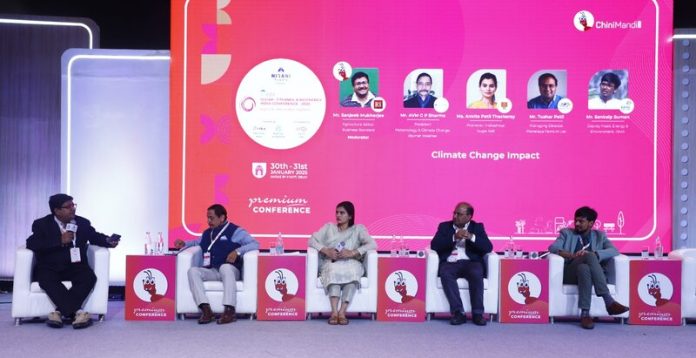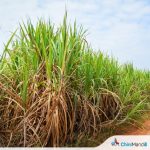Sugar – Ethanol & Bioenergy India Conference (SEIC) 2025, held from January 30 to 31, 2025, brought together industry stakeholders on one platform. The 4th edition of the conference kickstarted in New Delhi with a resounding inaugural session. The Union Minister of Road Transport and Highways Nitin Gadkari spoke about the bright future of the sugar industry, and the potential it has to contribute to 3% of the country’s GDP.
The first day saw four sessions where industry experts spoke on various important aspects of the sugar, ethanol, and allied sectors.
The 4th and concluding session of Day 1 was titled- “Climate Change Impact”
Moderator : Sanjeeb Mukherjee, BS, Agriculture Editor, Business Standard
Panellists :
AVM G P Sharma, President (Meteorology & Climate Change), Skymet Weather
Ankita Patil Thackery, Promoter, Indreshwar Sugar Mill
Tushar Patil, Managing Director, Planeteye Farm-Ai ltd
Sankalp Suman, Deputy Head, ISMA
The Moderator asked the panellists about the threat of climate change on sugarcane, and how to mitigate it through the use of AI and other technology.
Ankita Patil Thackerey said, “The sugar industry is heading towards sustainability, and it is very important to have a more backward integration outlook. The Maharashtra sugar mills are facing erratic rainfall, which is impacting soil fertility. Along with that, I feel the increase of global warming is having an impact, not just in the urban areas, but also in the rural belt. We need new and improved irrigation facility management. We have to educate our farmers with new and improved practices. We are reducing our carbon footprints with the introduction of EV vehicles, ethanol-blended fuels, etc”.
Regarding the use of AI and other technology to mitigate the threat of climate change, Tushar Patil said, “Climate change is often discussed for its negative impacts, but here’s a different perspective: Increased CO2 acts as a fertilizer. In crops like sugarcane, which has a 12-month cycle (eight months of vegetative growth and four months of maturity), we’ve observed an issue—sugarcane struggles to transition from vegetative to productive growth. Over the past four years, we’ve identified causes, including persistent humidity above 60% and inconsistent rainfall across key districts. This disrupts sugarcane’s metabolic pathway, delaying its maturity and sugar formation, leaving it as biomass instead. Satellite indices confirm this unusual phenomenon, which remains a significant challenge.
Whether sugarcane is a water guzzler crop, Sankalp Suman presented an important point. He said that, “There are reports that suggest that sugarcane is not a water guzzler. It does not consume as much water as people have been saying. The amount of ethanol it makes compared to other feedstocks, it is the most water efficient crop.
Regarding climate change, the linkage of carbon savings from biofuels is something that is still missing from the mainstream narrative. In Brazil, they have a system called Renova Bio, which gives carbon credits to the ethanol producers based on decarbonisation. That way, they can record how much carbon they are saving, as well as further incentive to the industry to further”.
AVM G P Sharma said, “Out of UP, Karnataka, Maharashtra has always been vulnerable. Though it’s a rain-fed area, there is erratic rainfall which makes it drought prone”.
The sugar industry is moving towards sustainability, emphasising the need for backward integration. The Panellists concurred that Maharashtra’s sugar mills face erratic rainfall, impacting soil fertility, while global warming affects both urban and rural areas. Improved irrigation management and farmer education on advanced practices are crucial. Efforts to reduce carbon footprints include EVs and ethanol-blended fuels.
The event saw the participation of some of India’s most innovative companies, including Nirani Sugars, KBK Chem – Engineering, Rika Global Impex, Rajganga Biorefineries, Dalmia Utsav Sugar, Praj Industries, DCM Shriram, Gruner Renewable Energy, CEID Consultants and Engineering, Aaditya Finechem, Mawana Sugars, TruAlt Bioenergy, and Novonesis, among others.












